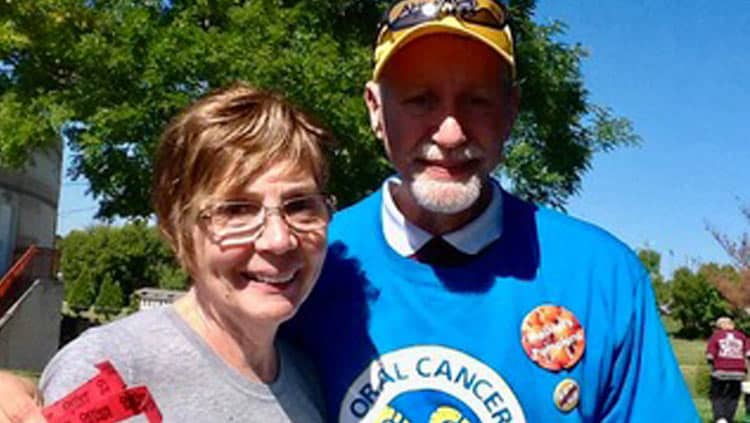When Linda and I met eight years ago (2014), she knew oral cancer was part of the package. I never explained the details about my surgery over 30 years ago, when I was 36 years old. This was me, and that was that.
We dated for two years, went to the movies, bought fresh produce from farmers’ markets, explored new cities and parks within driving distance, and dancing. On most Saturdays, she would sit beside me in the synagogue even though she was a devout Episcopalian. She loved to cook, and I loved to eat. We were a near-perfect match.
A cook who makes better food than we can ever find in a restaurant, Linda was amenable to compromises around meals, including tuning down her preference for spicy food to accommodate me. She would wait to start eating for the food to be at a temperature I could tolerate. If she had a glass of wine, she would have it alone. Her patience was admirable since I took such a long time to eat to avoid choking. Despite the compromises, it worked. She loved me, and I loved her. We married two years after meeting.
A year after that, I needed a hip replacement (2015). The doctors checked my mouth since the disease in the mouth can be systemic. All my lower teeth had to be removed before surgery. Tooth decay is a common long-term effect of radiation treatment. With my new hip, we could do new things like play golf. But we also had to adapt to my new eating challenges because false teeth are nothing like the real thing. When we had our yearly vacation with two other couples, managing my needs around food was challenging but doable. Life was good.
Four years later, swallowing became more difficult. I was losing weight and feeling weak. My worst fears were realized: advanced-stage laryngeal cancer. Another long-term effect of treatment is radiation-induced second malignancies (RISM). Not only did my voice box need to be removed, but my esophagus was affected too and needed to be replaced. I was used to adapting my needs around food, but to learn that I would never speak again? Devastating! Through sickness and health, Linda stuck by my side.
Swallowing was hard work, but dicing and chopping food small enough was even more complex. I’m all about ease and replaced solid food with protein shakes. Sometimes, I manage to eat well-dunked Milano cookies into a cup of lukewarm coffee for breakfast, along with pureed pears. Food goes down by gravity. I can’t bend over unless I want to see the consumed food make a return engagement.
It’s been three years now, and I still wake up wondering if it’s true that I can’t speak…and it is. I made my living in sales. I’m known for my quick wit. Now, I communicate primarily through e-mail and text. Socializing is mostly eating and conversation, neither of which I can do easily. On rare occasions, Linda and I go out with other people, and I use a type-to-talk program. My humor can still be conveyed, but my former rapid repartee is a thing of the past.
Not only does Linda manage my meds and food, but because my mobility has been impaired from surgery (which took part of my thigh to reconstruct my esophagus), she now has to help me dress, bathe and clean my lari tube, which gets clogged frequently during allergy season. Our routine keeps changing. The new adjustment is sustainable because we have managed to balance dignity with humor.
I’m a package deal, and I have become a heavy load. There are no days off, and every day repeats the day before. It’s easier for me to accept my life because Linda accepts me. I consistently express appreciation, show tenderness, and come up with a joke to make her laugh. My wife’s package included two cats, Big Girl, and Little Girl. I never trusted cats, but just as Linda became my life’s love, so did her two felines’ personalities. The cats have doubled the love, and with love, you can live any life, even mine.
Written by Eva Grayzel, OCF Correspondent-at-Large. This is the story of 31-year survivor David Eiskowitz from Allentown, PA. The Oral Cancer Foundation Walk for Awareness in Bethlehem, PA, could not have been as successful without David’s contributions. David likes to hear this message he left for the chair, Eva Grayzel, after another successful walk in 2013. He is grateful to hear his former voice.






